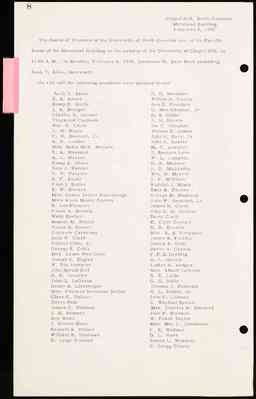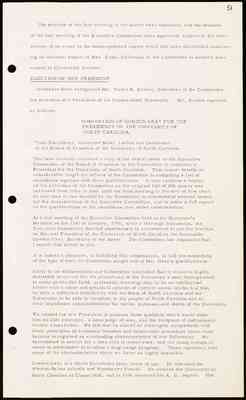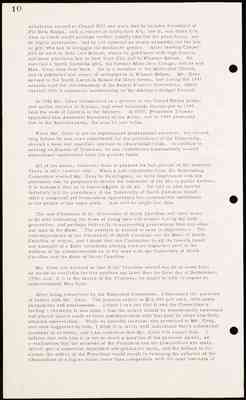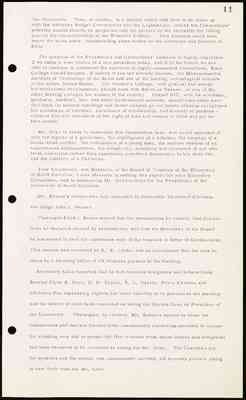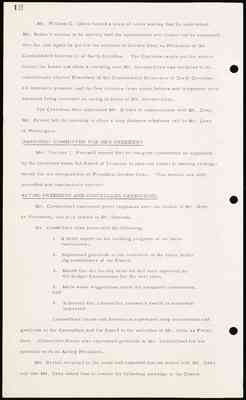Pages
8
Chapel Hill, North Carolina Morehead Building February 6, 1950
The Board of Trustees of the University of North Carolina met in the Faculty Room of the Morehead Building on the campus of the University at Chapel Hill, at 11:00 A.M., on Monday, February 6, 1950, Governor W. Kerr Scott presiding, Arch T. Allen, Secretary.
On roll call the following members were present to-wit:
Arch T. Allen E. S. Askew Kemp D. Battle J. A. Bridger Charles A. Cannon Thurmond Chatham Wm. G. Clark A. M. Dixon F. W. Hancock, Jr. A. H. London Mrs. Sadie McB. McCain R. A. Maynard A. L. Monroe Kemp B. Nixon John J. Parker R. W. Proctor B. F. Royal Fred I. Sutton E. W. Stevens Mrs. Grace Taylor Rodenbough Miss Annie Moore Cherry R. LeeWhitmire Frank A. Daniels Wade Barber Samuel M. Blount Victor S. Bryant Gertrude Carraway John W. Clark Collier Cobb, Jr. George S. Coble Mrs Laura Weil Cone Joseph C. Eagles W. Roy Hampton John Sprunt Hill B. K. Lassiter John Q. LeGrand Henry A. Lineberger Mrs. Frances Newsome Miller Glenn C. Palmer Edwin Pate James C. Pittman J. E. Ramsey Roy Rowe J. Benton Stacy Kenneth S. Tanner William B. Umstead E. Leigh Winslow
H. D. Bateman Wilbur H. Currie Ben E. Fountain O. Max Gardner, Jr. H. S. Gibbs A. H. Harris Ira T. Johnston Vernon G. James John H. Kerr, Jr. John C. Kesler M. C. Lassiter J. Spencer Love W. L. Lumpkin H. B. Marrow L. P. McLendon Wm. D. Merritt J. F. Milliken Rudolph I. Mintz Rosa B. Parker George M. Stephens John W. Umstead, Jr. James H. Clark John G. H. Geitner David Clark K. Clyde Council B. B. Everett Mrs. R. S. Ferguson James S. Ficklen James A. Gray Harry A. Greene F. D. B. Harding R. L. Harris Luther H. Hodges Mrs. Albert Lathrop R. E. Little G. N. Noble Thomas J. Pearsall H. L. Riddle, Jr. John C. Lodman C. Wayland Spruill Mrs. Charles W. Stanford John P. Stedman W. Frank Taylor Mrs. May L. Tomlinson F. E. Wallace D. L. Ward James L. Woodson R. Gregg Cherry
10
scholastic record at Chapel Hill was such that he became President of Phi Beta Kappa, with a record of thirty-five A's, one B, and three C's. This in itself would perhaps neither qualify him for the presidency, nor be highly persuasive, had he not retained an innate sympathy for the boy or girl who has to struggle for mediocre grades. After leaving Chapel Hill he went to Yale Law School, where he graduated with high honors, and later practices law in New York City and in Winston-Salem. He married a North Carolina girl, the former Miss Jane Craige, and he and Mrs. Gray have four boys. He is a member of the Methodist Church, and is publisher and owner of newspapers in Winson-Salem. Mr. Gray served in the North Carolina Senate for three terms, and during the 1947 session held the chairmanship of the Senate Finance Committee, which carried with it automatic membership on the Advisory Budget Council.
In 1942 Mr. Gray volunteered as a private in the United States Army, saw active service in Europe, and when honorably discharged in 1945 held the rank of Captain in the Infantry. In 1947, President Truman appointed him Assistant Secretary of the Army, and in 1949 promoted him to the Secretaryship, the post he now holds.
While Mr. Gray is not an experienced professional educator, his record, long before he was ever considered for the presidency of the University, showed a keen and unselfish interest in educational fields. In addition to serving on Boards of Trustees, he has contributed substantially toward educational institutions from his private funds.
All of the above, however, fails to present the full picture of the nominee. There is still another side. When a sub-committee from the Nominating Committee visited Mr. Gray in Washington, we were impressed with his statement that he proposed to devote the reminder of his life to public service. It is fortunate that he is financially able to do so. He told us also that he definitely felt the presidency of the University of North Carolina would offer a congenial yet tremendous opportunity for constructive usefulness to the people of his home state. And well he might feel this.
The new President of the University of North Carolina will have more to do with fashioning the lives of young men and women during the next generation, and perhaps indirectly in succeeding generations than any other one man in the State. The position is second to none in importance. The interdependence of the University of North Carolina and the State of North Carolina is unique, and I doubt that our Committee in all its travels found any example of a State university playing such an important part in the welfare of its commonwealth as is the case with the University of North Carolina and the State of North Carolina.
Mr. Gray has advised us that if the Trustees should see fit to name him, he would be available for this position not later than the first day of September, 1950, and, if it is the desire of the Trustees, he might be able to report by approximately May first.
After being authorized by the Executive Committee, I discussed the question of salary with Mr. Gray. The present salary is $12,000 per year, with some perquisites and emoluments. I think I can say that it was the Committee's feeling - certainly it was mine - that the salary should be substantially increased and placed upon a scale at least commensurate with that paid by other similarly situated universities. While no specific increase was promised to Mr. Gray, and none suggested by him, I think it is fairly well understood that a substantial increase is in order, and I am confident that Mr. Gray will expect this. I believe that with him it is not so much a question of his personal salary, as a realization that the salaries of the President and the Chancellors are maintained upon a somewhat dependent and graduated basis, and the failure to increase the salary of the President would result in retaining the salaries of the Chancellors at a figure much lower than compatible with the best interests of
11
the University. This, of course, is a matter which will have to be taken up with the Advisory Budget Commission and the Legislature, unless the Chancellors' salaries should shortly be projected into the picture by the necessity for filling quickly the chancellorship at the Woman's College. This question could then reach the acute state, necessitating some action by the Governor and Council of State.
The question of the President's and Chancellors' salaries is highly important. If we make a wise choice of a new president today, and if in the future we are able to continue to command the services of highly competent chancellors, State College should become, if indeed it has not already become, the Massachusetts Institute of Technology of the South and one of the leading technological schools in the entire United States. The Woman's College, with gradual and steady but wholesome development, should rank with Smith or Vassar, or any of the other leading colleges for women in the country. Chapel Hill, with its academic, graduate, medical, law, and other professional schools, should also make sure that from its ancient buildings and broad campus go out future citizens recognized for soundness of intellect, excellence of scholarship, and honesty of purpose - citizens who are defenders of the right of men and women to think and act as free people.
Mr. Gray is ready to undertake this tremendous task, and would approach it with the dignity of a gentleman, the intelligence of a scholar, the courage of a battle-tried soldier, the enthusiasm of a young man, the mature wisdom of an experienced administrator, the simplicity, sympathy and tolerance of one who from conviction rather than expediency practices democracy in his daily life, and the humility of a Christian.
Your Excellency, and Members of the Board of Trustees of the University of North Carolina, I take pleasure in making this report for your Executive Committee, and in nominating Mr. Gordon Gray for the Presidency of the University of North Carolina.
Mr. Bryant's motion was duly seconded by Honorable Thurmond Chatham and Judge John J. Parker.
Thereupon Fred I. Sutton moved that the nominations be closed, that Gordon Gray be declared elected by acclamation, and that the Secretary of the Board be instructed to cast the unanimous vote of the trustees in favor of Gordon Gray. This motion was seconded by R. E. Little, and an amendment that the vote be taken by a standing ballot of all trustees present at the meeting.
Secretary Allen reported that he had received telegrams and letters from Senator Clyde R. Hoey, H. P. Taylor, R. L. Harris, Percy Ferebee and Clarence Poe expressing regrets for their inability to be present at the meeting and the desire of each to be recorded as voting for Gordon Gray as President of the University. Thereupon, by consent, Mr. Sutton's motion to close the nominations and declare Gordon Gray unanimously electedvas amended to include the standing vote and to permit the five trustees from whom letters and telegrams had been received to be recorded as voting for Mr. Gray. The Chairman put the question and the motion was unanimously carried, all trustees present rising to cast their vote for Mr. Gray.
